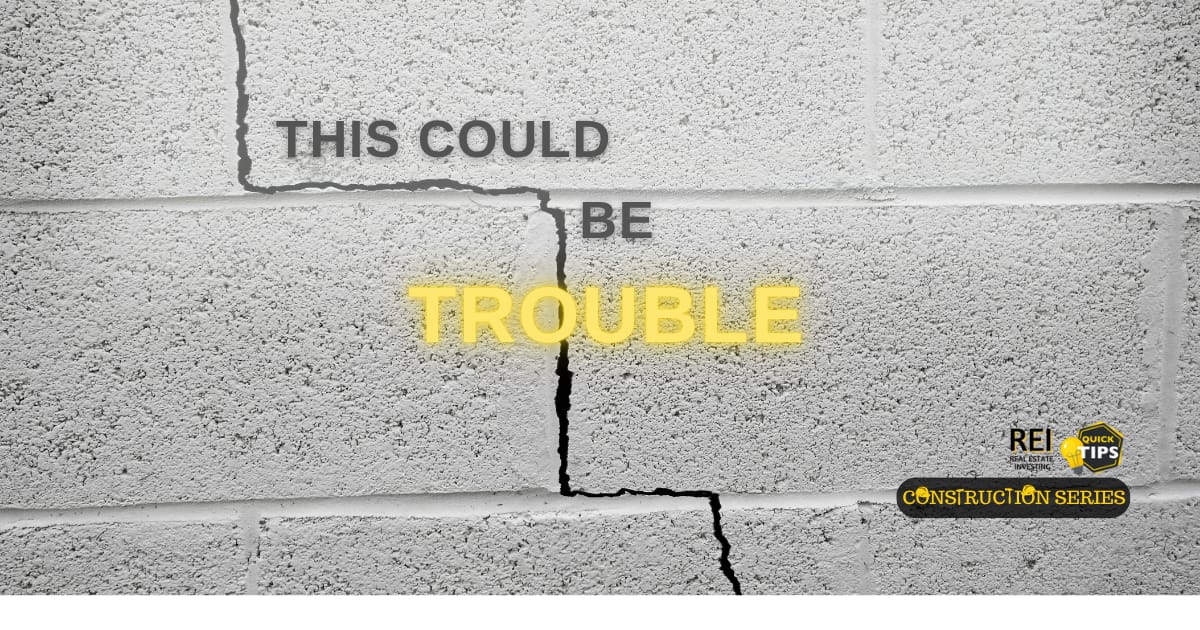Invest right from your couch
Have you always been kind of interested in investing but found it too intimidating (or just plain boring)? Yeah, we get it. Luckily, today’s brokers are a little less Wall Street and much more accessible. Online stockbrokers provide a much more user-friendly experience to buy and sell stocks—right from your couch. Money.com put together a list of the Best Online Stock Brokers to help you open your first account. Check it out!

There are three types of investors:
Those who inspect the foundation
Those who learn to inspect the foundation after losing $40K
And those who just keep flipping and praying
Let’s not be #3.
A foundation issue doesn’t always show up with a dramatic crack running down the living room wall. Sometimes it hides. And if you don’t know what to look for, it will sneak past your due diligence and into your rehab budget like a ninja with a jackhammer.
Here’s how to spot the red flags before the house sinks — financially or literally.
1. Sloping or Uneven Floors
Feel like you're walking downhill in the living room?
Not a design feature. Could be settling. Could be a broken pier. Could be a nightmare.
Bring a golf ball next time you walk a property. If it rolls across the room unassisted, so will your budget.
2. Cracks in the Drywall or Exterior Brick
Hairline cracks? Maybe just expansion.
Stair-step cracks in brick or wide cracks over door frames? That’s structural.
3. Doors and Windows That Stick or Swing
If every door in the house either won’t close or swings open like a saloon entrance, something’s off.
That’s movement. Could be moisture, could be settling — either way, it means shifting structure.
4. Gaps at the Top of the Walls or Cabinets
That weird 2-inch gap between the crown molding and the ceiling? It wasn’t a design choice.
When framing moves, gaps open up — and not just in your resale value.
5. Moisture Around the Foundation
Water is the #1 cause of foundation issues.
Check for:
Poor drainage
Pooling at the base of the home
Efflorescence (white chalky powder) on basement walls
Mold or mildew odor = guaranteed headache
Bonus tip: Check grading. If the ground slopes toward the house, water is already heading where it shouldn’t.
6. Trees Too Close to the House
Roots can be silent killers — creeping under the foundation and applying pressure you won’t see until your floor tile looks like a jigsaw puzzle.
As a rule: large trees should be at least 20 feet from the house. If not, brace yourself (and maybe budget for root barriers).
7. Crawlspace Clues
If there’s a crawlspace, suit up and go in (or pay someone who will).
Look for:
Standing water
Insect activity
Rotted beams
Slanted piers
Or anything that makes you want to call your therapist
When to Walk, When to Negotiate
Foundation issues aren't always a deal breaker — but they’re always expensive and unpredictable.
Ask yourself:
Can it be stabilized, or does it need full replacement?
Has a structural engineer assessed it?
Can you negotiate the repair cost down from the purchase price?
Do you have enough margin to absorb surprises?
And if the answer is “I don’t know,” the correct answer is usually: “Then don’t buy it.”
Final Word
Some foundation issues can be fixed with piers and epoxy.
Others are like trying to staple a sponge to a rock and call it level.
Know the difference.
Inspect before you regret.
And never let your confidence in the kitchen cabinets blind you to the horror show happening six feet below.
Wall Street Isn’t Warning You, But This Chart Might
Vanguard just projected public markets may return only 5% annually over the next decade. In a 2024 report, Goldman Sachs forecasted the S&P 500 may return just 3% annually for the same time frame—stats that put current valuations in the 7th percentile of history.
Translation? The gains we’ve seen over the past few years might not continue for quite a while.
Meanwhile, another asset class—almost entirely uncorrelated to the S&P 500 historically—has overall outpaced it for decades (1995-2024), according to Masterworks data.
Masterworks lets everyday investors invest in shares of multimillion-dollar artworks by legends like Banksy, Basquiat, and Picasso.
And they’re not just buying. They’re exiting—with net annualized returns like 17.6%, 17.8%, and 21.5% among their 23 sales.*
Wall Street won’t talk about this. But the wealthy already are. Shares in new offerings can sell quickly but…
*Past performance is not indicative of future returns. Important Reg A disclosures: masterworks.com/cd.



